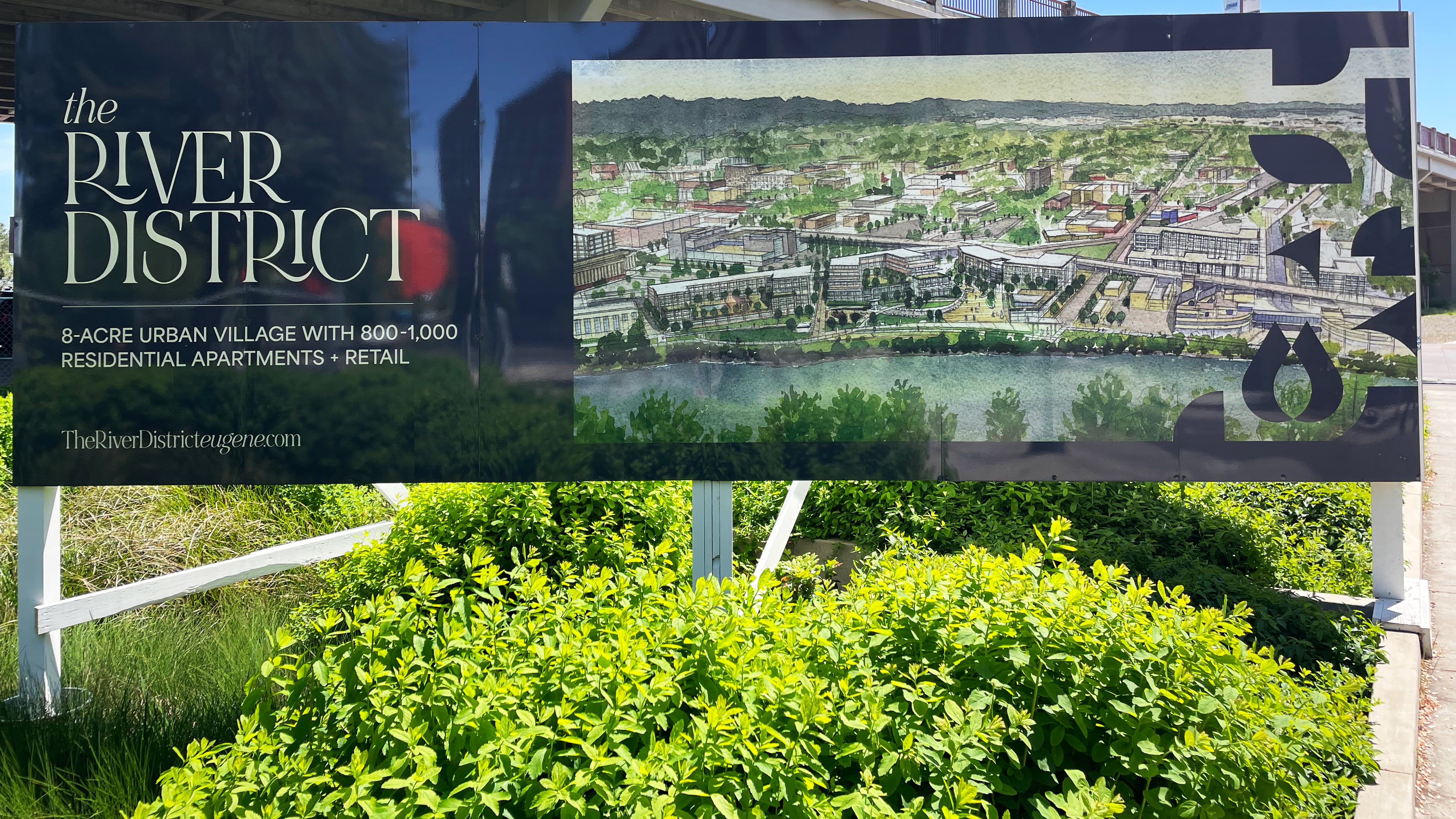This story was produced by the Oregon Journalism Project, a nonprofit newsroom covering the state.
EUGENE — On a rainy mid-November afternoon, the only sound coming from vacant building lots clustered along the Willamette River is the insistent honking of a flock of geese. Gone are the hardhats, toolbelts and backhoes that for the past couple of years marked the beginning of the long-awaited conversion of industrial land along the river to badly needed housing.
Work has ground to a halt on the redevelopment of several lots that are slated to link the city’s downtown to the University of Oregon and alleviate a housing shortage in the state’s second-largest city. Developers hoped to build more than 1,000 new units on the property, but after completing the second apartment building on the site in mid-June, they have put down their hammers.
At issue: a dispute between the developer, Eugene Riverfront District LLC, and the Oregon Bureau of Labor & Industries over whether the privately funded portions of the project should pay prevailing wage. BOLI is the arbiter of Oregon’s prevailing wage law. That law requires in part that if a project uses more than $750,000 in public funds, the project’s developers must pay “prevailing,” i.e., union wages, to workers on the project.
That is an important consideration because studies in Oregon and elsewhere have found that prevailing wages can add 10% to 20% to total project costs.
The dispute in Eugene concerns redevelopment of property long owned by the Eugene Water & Electric Board. In separate transactions, the city acquired the headquarters building and the surrounding land, which it then prepared for redevelopment by the private sector.
As part of that preparation, the city paid for certain public improvements: streets, utilities and parks. Nobody disputes that those public expenditures are subject to prevailing wages. But BOLI has determined that developers of the rest of the land must also pay prevailing wages, even though they are using private funding. The BOLI rationale: The private projects would not happen without public investment and therefore they are all one big project.
The developer’s attorney, Dina Alexander, disagrees with BOLI’s decision, which she says is having a chilling effect on potential public-private partnerships across Oregon. “The ‘EWEB BOLI problem’ continues to stymie large-scale developments that would provide much-needed housing and increased tax revenue for local jurisdictions,” Alexander says.
“I have spoken to parties about prevailing issues associated with potential projects all over the state, including in the Portland metro area, Salem, Eugene/Springfield, Columbia County, Central Oregon, and Southern Oregon. BOLI has undermined the traditional way in which public and private sectors partner to redevelop these types of underutilized properties.”
As the Oregon Journalism Project has previously reported, large public-private partnerships such as those that drove the development of the Pearl and South Waterfront districts in Portland relied on publicly funded infrastructure—streets, sewers and utilities—and privately funded housing and commercial space.
In 2007, however, the Oregon Legislature amended the state’s prevailing wage law to require that projects backed by more than $750,000 in public funds pay construction workers prevailing wages. The law says in the case of public-private partnerships that BOLI “shall divide the project, if appropriate,” and issue a “split determination” that the publicly funded part be subject to prevailing wage, but not the privately funded part.
The city of Eugene had—and still has—high hopes for its waterfront district, once home to EWEB’s headquarters (now Eugene City Hall) and an adjacent swath of parking and storage space for the municipal utility.
“Many cities across the country have former utility yards along their waterfronts and riverfronts. The most forward-thinking cities are repurposing these valuable spaces for civic use,” Eugene Mayor Kaarin Knudson told OJP earlier this year.
“Eugene needs more affordable housing, more compact housing, and more housing in walkable neighborhoods,” she added. “ Downtown presents a unique opportunity to accomplish all of these goals.”
In 2020, the project’s developers applied to BOLI for a prevailing wage determination. The city of Eugene told BOLI it planned to install parks, roads and other infrastructure at a cost of nearly $35 million.
At the same time, the developers laid out an acquisition and development schedule for the 13 separate parcels of land that would be converted to housing, commercial and hotel space, and the city’s new waterfront park.
In May 2021, then-BOLI Commissioner Val Hoyle issued a determination on the Eugene Riverfront, finding that “all portions of the revised project rely on funds of a public agency and therefore division [into separate public and private parts] is not appropriate.”
Alexander, the land use attorney representing the developers, asked BOLI to reconsider its decision. Her point: Since the housing and commercial space depend on private funds, developers shouldn’t have to pay prevailing wages, as the “split decision” section of state prevailing wage law allows.
In response to recent questions from BOLI, Alexander laid out a grim future for the fallow land.
“The application of prevailing wage rates to the remaining projects has made development infeasible,” she wrote in an Oct. 6 letter to the agency.
“Rental rates in Eugene are simply not high enough when compared to prevailing wage rates to render the projects economically viable. But for the determination made by BOLI…additional units would be under construction or already delivered.”
Alexander delivered her response to the agency, which under current Labor Commissioner Christina Stephenson has drawn increased scrutiny for its union-friendly determinations, even as the state struggles to relieve a chronic housing shortage.
Stephenson’s spokeswoman, Rachel Mann, declined to comment on the halt of the Eugene project, explaining that the agency is still evaluating the developers’ request for reconsideration.
“BOLI’s decisions are based solely on the statutory and factual criteria outlined in Oregon’s prevailing wage law,” Mann tells OJP. “As with any such request, we are reviewing it through our standard process.”

